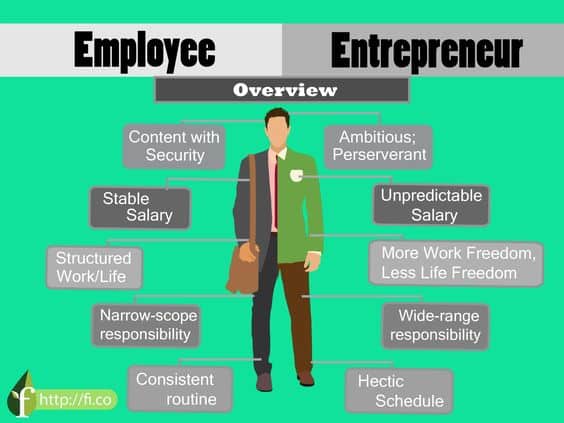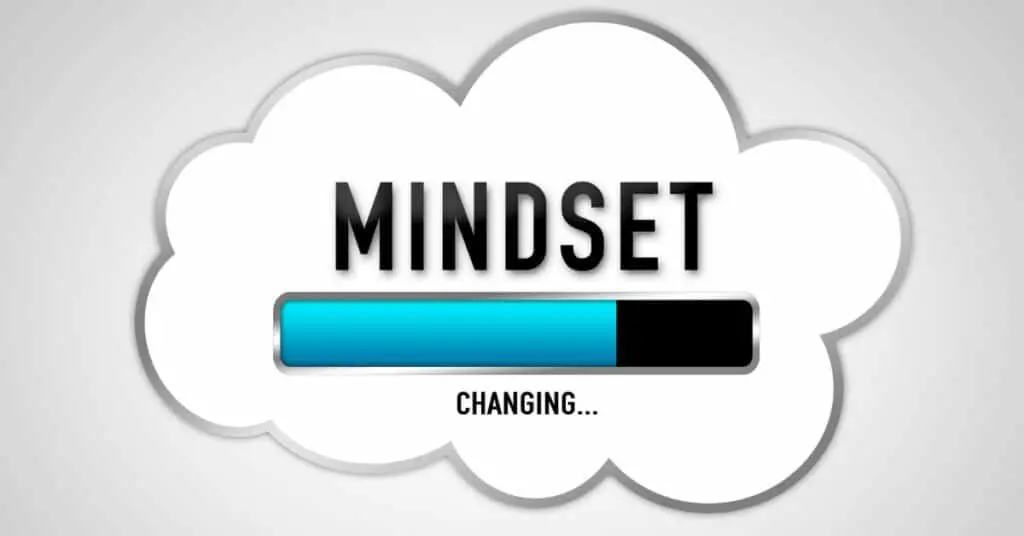The Employee vs Entrepreneur Mindset: Which One Do You Have?
There are stark differences between the employee vs entrepreneur mindset. This means making the switch from employee to entrepreneur can be a challenge. It requires a different mindset and set of skills.
Before we uncover the differences between the two. We need to know what mindset is and why is it important for you to cultivate entrepreneur mindset when you start your own business.
Why Is Having An Entrepreneur Mindset Important?
Mindset is a psychological term that refers to the beliefs, attitudes, and expectations we have about ourselves, our abilities, and our future. For example, if you have a positive mindset, you may believe that you can succeed in your career or relationship. You may be confident that you will reach your goals.
Thus, having the right mindset is important for your entrepreneurial success. As they say, “watch your thoughts as your thoughts create your reality“.
Key Difference Between The Employee vs Entrepreneur Mindset

The key difference between the two mindset stems from the fact that since the employee believes that they are just working for someone else, they just need to do what they are told to do and up to the point that meets the requirements of the job to get paid.
For the entrepreneurs, since they are their own boss, they have a vision and a goal for their business. They are going to do whatever it takes to make it happen and are always willing to go the extra mile.
There are other important differences between the two and they are listed below:
Employees trade time for money while entrepreneurs creating value for money
As employees, we get paid for the time we spend on working. Therefore, we report for work and clock in the time everyday from 9 to 5 (or whatever their working hours may be) whether physically or remotely. As long as we do the work, we get paid.
On the contrary, entrepreneurs are not paid for the amount of time they spend working. They make money from the value they create for their customers. Which means to say you may not make any money at all even if you work very hard but at the wrong thing.
The important thing is when you become an entrepreneur, you need to value your time as a important resource and spend it on revenue-generating activities, i.e. in those activities that will help make you money.
And since your time and energy is limited, you may also need to delegate or outsource some tasks to others so that you can focus on the revenue-generating activities later on when your business grows to a certain scale.
Employees live for the next paycheck while entrepreneurs have several income sources
As a result of the previous point, employees have been conditioned to get used to receiving regular a monthly salary so they are contented with their pay and live from month to month waiting for the pay day. They believe in “getting a fair day's pay for a fair day's work”.
This is something that I am not very used to when I first started working for myself. When I was an employee, every month there would be money coming in on my pay day. However, when we were doing our own business, there could be months where there was not much money coming in and seeing that the savings were being depleted bit by bit to pay the bills and expenses. That could be quite frightening.
However, it is precisely because entrepreneurs know that there are uncertainties in business, they often have to be creative and innovative in order to find new ways to make money. This is so that they do not put all their eggs in one basket. This can include starting their own business, finding new ways to market their products, or selling shares in their company. Budgeting and being in control of their finances is thus very important for entrepreneurs.
Employees are responsible only for the area under their charge while entrepreneurs make ALL the decisions
After having been an employee all my life until I first started my business in 2014, I suddenly realized that becoming a business owner meant that I am responsible for EVERYTHING. Yes, everything! I have to be answerable for every decision make, whether they are right or wrong.
This is unlike being an employee where I just need to answer to my boss and are just responsible for my assigned responsibilities. So like what Uncle Ben of Spiderman said in the movie “with great power comes great responsibility”, being my own boss means I have to be responsible for it all and no more excuses or blaming anybody else when things are not working out the way they should.
Employees are single-tasking masters while entrepreneurs are jacks of all trades and masters of none
Since entrepreneurs need to handle all aspects of their business, particularly at the startup stage, they are always trying to learn new things and grow their businesses. But they can't do it all and therefore they need to focus on a few key areas and delegate the rest.
On the other hand, employees could focus on a single task and see it through to completion so they are less “distracted” than entrepreneurs. For example, accounts just need to focus on taking care of the accounts.
Employees see problems while entrepreneurs see opportunities
As employees are typically focused on the tasks at hand and in their own restricted area, they rarely see the big picture. Entrepreneurs, on the other hand, are often focused on the future and can often see potential opportunities in the problems that need to be addressed.
To be an entrepreneur, you need to cultivate this ability to see problems as opportunities so that you are able to come up with solutions that would help to solve problems for your customers. By doing this, you will then be able to provide values to them and get paid for the values you provide them with.
Employees work to a schedule while entrepreneurs create their own.
Employees are used to working the regular work schedule (such as 9 to 5) as specified by their company. Since entrepreneurs answer to themselves, they are free to create their own schedule and do not need to stick to a fixed schedule.
However, this is usually what people who made the switch from employment to self-employment most finding most difficult to get used to. This sudden availability of freedom could mean that they do not know what to do with all the time they have on hand.
Furthermore, since there are so many things to do, they don't know where to start and therefore they may fall into the trap of procrastinating or worst doing nothing if they lack the discipline. It is therefore important that you set goals and define what you need to accomplish to achieve the goals for your day to day and have accountability to yourself.
Employees want clear guidance while entrepreneurs create their own path for success
As employees, we are used to being told what to do by our superiors. We are encouraged to ask for permissions if we are not sure rather than being a smart alec and make our own decisions which may lead to mistakes and failures.
However, once you become an entrepreneur, you need to chart your own path and find out what needs to be done and do them. Nobody is going to tell you what to do. For some people, this definitely takes a lot of getting used to while for others, they may feel that it's liberating.
Employees fear failure while entrepreneurs embrace it
As mentioned earlier, employees fear failure as very often they are not given the leeway to make any mistakes. Therefore, employees fear being punished for making mistakes or failing or worse, losing their jobs.
Entrepreneurs take calculated risks and know that they may still fail even with this. Yet, they are confident that they can learn and improve from their mistakes. Therefore, this is another thing that you need to get used to when transiting to entrepreneurship – i.e. knowing that you are most likely not going to succeed on first try. You will experience failure along the way but never give up, just keep learning and trying!
Employee “Security is taking no risks.” vs. Entrepreneur “Security is taking calculated risks.”
The employee mindset is one of security and predictability. To the employees, having a stable job is most secure with a regular monthly salary. Thus, employees prefer to play it safe and not try new things or try to rock the boat. They also feel that business is risky since it can go up and down.
However, it is not true that having a job is most secure today given the ever-changing technology and increasing automation. More and more jobs are being displaced. Thus, the seemingly “secure” jobs can be gone suddenly as seen from the many job losses during Covid.
On the contrary, the entrepreneur mindset is one of opportunity and growth. Therefore, they are willing to try new things and innovate. Entrepreneurs understand they need to take risks as no risk, no gain. However, they also know that the kind of risk they will take is a calculated one. Therefore, they would do their homework and be prepared before going into any venture. If you want to be an entrepreneur, you need to learn to think like one.
Price tags tell employees what they need to pay to receive a given product or service and whether they can afford it. And they usually give up and feel discouraged if they feel that the price tag of something is out of reach for them.
On the contrary, entrepreneurs do not only see the price tags to decide whether they should buy or not. They would ask themselves whether they can generate any Return on Investment (ROI) if they pay for the product or service. And if they do not have sufficient money to pay for it, the price tags would serve as a motivation for them to look for ways to create that money to afford it.
Employee “I must know it all.” vs. “Entrepreneur “I’m constantly learning.”

Employees feel that they need to know everything before they start doing something. The entrepreneurs, on the other hand, know that they need to keep learning new things and get new ideas in order to tap into new opportunities.
Employees try to do it all by themselves while Entrepreneurs try to do together
Because of the way most rewards system in the organizations are structured where employees are mostly assessed by their individual performance, employees tend to do it all by themselves so they could outshine their colleagues.
Entrepreneurs know that they cannot possibly know or do it all, so they learn from others or delegate or outsource to others to do more. They also look for collaboration opportunities to work with others so that together they can achieve more.
Conclusion
In conclusion, there are critical differences between the employee vs entrepreneur mindset. Understanding these differences is crucial for anyone transitioning from being an employee to successful entrepreneurship.
As an entrepreneur, you are responsible for your own success or failure. You need to take risks, be creative and think outside the box to be successful. If you can master these skills, you will be well on your way to becoming a successful entrepreneur.
FULL DISCLOSURE: This page contains affiliate links which means we receive a small commission at no cost to you when you make a purchase. As an Amazon Associate, I earn from qualifying purchases.
Useful Resources
Below are some useful reference books on how to shift your mindset to be more entrepreneurial you may wish to check out:
References
- Overview of the difference of The Employee vs Entrepreneur Mindset Image from http://fi.co









Hi Penny,
I enjoyed this post. It gave me more clarity about the fundamental differences between the employee and entrepreneurial mindset and outlook.
I really applaud for all your tips. Everyone wants to walk out of 9-5 wagon and the thought “who needs a boss?” Why cant I have my own business. It may be easier said than done.
One needs to have some startup money to begin with as an entrepreneur. It may help to ingrain idea of self made business while you take up a job. So you may set aside some of your earned income. You may start a small side hustle while while through a 9-5 job or be a par-timer. There are risk and security issues in 9-5 or as an entrepreneur today. The major difference is you can have control over your own business (may be) but not in a corporate lay off.
I read quite a bit of how to keep yourself healthy. That was inner interest. I love to be good trader making a reliable consistent income from stock market by self learning and applying. I set some money aside, opened a health and wellness website. I work all five days of the week (excluding stock market holidays) to learn and earn some.
I try to bring few other income streams in and help myself and the society.
Hi Anusuya,
Thanks for your comment and sharing! I am glad that you enjoyed the post and it has helped you.
Yes, you are absolutely right that health is wealth and it’s important to keep oneself healthy before anything else. I wish you the best in your journey! 🙂
If your mindset is only set as an employee then you will not be successful as you would think only working to get other people rich. Have the mindset of an entrepreneur and set your goals, you will always work towards achieving your goals and making money for yourself and no one else. I really enjoyed reading your article and learning about the difference in mindsets when running a business online.
Hi Jannette,
Thanks so much for sharing your thoughts about the importance of having an entrepreneur mindset for business success! I am happy to know that you enjoyed reading the article and learned something. 🙂